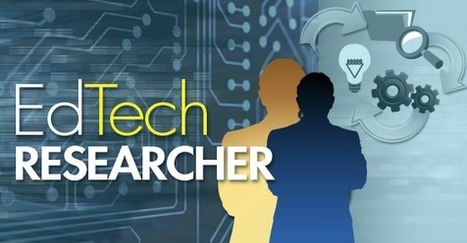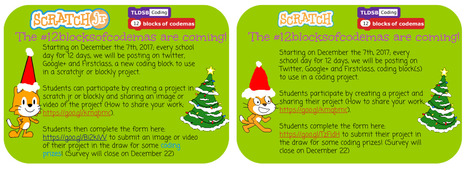 Your new post is loading...
 Your new post is loading...

|
Scooped by
John Evans
|
Combine a makerspace, science fair and a coding bootcamp and you have South Fayette School District, a computational carnival for 3,200 students south of Pittsburgh.
With four schools on one suburban campus, South Fayette is the best example of K-12 integrated computational thinking we’ve seen. Yes, kids are learning to code but more importantly, they are learning to attack complex problems, analyze data, and sprint in teams to public products.

|
Scooped by
John Evans
|
Like a lot of children, my sons, Toby, 7, and Anton, 4, are obsessed with robots. In the children’s books they devour at bedtime, happy, helpful robots pop up more often than even dragons or dinosaurs. The other day I asked Toby why children like robots so much.
“Because they work for you,” he said.
What I didn’t have the heart to tell him is, someday he might work for them — or, I fear, might not work at all, because of them.
It is not just Elon Musk, Bill Gates and Stephen Hawking who are freaking out about the rise of invincible machines. Yes, robots have the potential to outsmart us and destroy the human race. But first, artificial intelligence could make countless professions obsolete by the time my sons reach their 20s.
"Thanks to the successes of campaigns like the Hour of Code and this week’s Computer Science Education Week, educators, policymakers, and families around the country are realizing the value of coding and computer science in K-12 education. But how do “code,” “computer science,” and, “computational thinking,” fit together? What is motivating their introduction into schools, and how might they change education?
Our new report, Computational Thinking for a Computational World, draws from research and interviews with leaders around the country to answer the essential question: In a computational world, what is important to know and know how to do?
The report describes how computational thinking is both central to computer science and widely applicable throughout education and the workforce. It is a skillset for solving complex problems, a way to learn topics in many disciplines, and a necessity for fully participating in a computational world."

|
Scooped by
John Evans
|
"A series of 6 classroom wall posters to promote the concept of computational thinking.
Alongside the 4 parts of computational thinking (Decomposition, Pattern Recognition, Abstraction and Algorithm design), I have also included debugging which includes common errors (example syntax and logical)."
"Welcome to the TVO TeachOntario Coding and Computational Thinking in the Classroom Hub.
We are excited to serve as the guest hosts for this hub, as we showcase coding and computational thinking ideas, research, activities and practices from educators around the province.
This hub is meant to serve as a collaborative place where we can all develop our understanding surrounding innovative practices related to coding and computational thinking. We also hope that it can serve as a responsive, ever-changing resource that meets the..."

|
Scooped by
John Evans
|
"What does it really mean to prepare students for a future in coding careers? Clive Thompson, a freelance writer for Wired and The New York Times magazine, thinks the reality is not as rosy as many people think.
In a popular Wired article titled, The Next Big Blue-Collar Job is Coding, Thompson criticizes pop culture and some writers, like himself, for overly romanticizing the notion of the ‘lone genius coder’—the Mark Zuckerbergs and Mr. Robots of the world—saying that’s not what every coder looks like and that's not what many coders will be.
They don’t let just self-trained amateurs show up at Boeing and start building planes alongside the pros. That happens all the time in software.
Thompson recently talked with EdSurge about the future of programming work in the United States and the realities students will face in their future job searches. The conversation has been edited and condensed for clarity. Listen to a complete version of the interviews below, or on your favorite podcast app (like iTunes or Stitcher)."

|
Scooped by
John Evans
|
If there is one piece of advice that is drilled into you as a new parent, it is to limit screen time. Bringing home our first baby, I may have not known how to effectively swaddle or change a diaper, but I did know, “back is best” and “no screen time for children under two.” Yet, screens are something we as parents are constantly interacting with. In those early days of parenting, our parents laughed as we announced that we would not expose our children to screens. Yet screens are such a piece of our world. How could I expect a child not to find interest in the screens and technology that we interact with routinely? Does this abstinence approach to teaching new parents and those who work with our youngest learners do more harm than good? Does coding and computational thinking have a place in early childhood education? Yes, it certainly does.

|
Scooped by
John Evans
|
Computational thinking for every student: Teaching and learning computational thinking is the key to preparing Singaporeans for the digital century By Professor Looi Chee Kit National Institute of Education, Nanyang Technological University

|
Scooped by
John Evans
|
Explore these engaging lessons from Learning.com and see how you can seamlessly integrate Computational Thinking into standard curriculum.

|
Scooped by
John Evans
|
" I have been integrating coding into my Elementary classroom for the last few years, and I have started to see more and more benefits as students began to think computationally through various challenges. It does take time to teach students how to code, but the benefits are quickly apparent. They learn the iteration process through testing code they have written as it runs on the computer. Failure is simply part of the learning experience and we apply this mentality to other subjects as well. We don’t code everyday in class, we use it when it fits into the curriculum. It becomes a tool that some students use more often than others, for some it is the best way for them to think and design their solution to a problem.
One of the questions I asked myself as an educator was:
“How does integrating coding into a student’s work flow change the way they approach various challenges?”""

|
Scooped by
John Evans
|
With Computer Science in Education (CSED) Week and Hour of Code right around the corner, we have a simple request: Don't teach coding. Instead, we suggest that you introduce computational thinking and creative problem solving into your classroom. This way, you can get at the big ideas behind computer science rather than focus on a single activity or lesson involving "code."

|
Scooped by
John Evans
|
Released in 2013, the NGSS was created to align science education with how scientists actually work and think. It encourages students to learn science content and concepts deeply by using critical thinking and primary investigation skills. Adopted by 18 states (with as many as 40 interested and in the process), the standards define science education through core concepts (such as wave properties), practices (like analyzing and interpreting data ) and crosscutting concepts (like cause-and-effect).
Some of the NGSS guidelines directly overlap with the practices listed in the K-12 Computer Science framework and the new CSTA Computer Science standards. Here’s a doodle that illustrates how the two subjects overlap.

|
Scooped by
John Evans
|
Teaching London Computing in conjunction with cs4fn and support from Google have produced a series of fun activities and booklets based around puzzles that teach computing topics and computational thinking for use in the classroom, suitable for all ages.
Do the puzzles and develop computational thinking skills as well as learn about some core computing topics.
|

|
Scooped by
John Evans
|
"To get into the coding and holiday spirit, TLDSB will be doing the #12blocksofcodemas this year! Each day, starting on December 7th, a new block of code for Scratch and ScratchJr will be announced on Twitter, Google+ and in the Staff Lounge in FirstClass. Students that participate can submit their projects to entered in a draw to win a prize for their school!"

|
Scooped by
John Evans
|
"Thanks to the successes of campaigns like the Hour of Code and this week’s Computer Science Education Week, educators, policymakers, and families around the country are realizing the value of coding and computer science in K-12 education. But how do “code,” “computer science,” and, “computational thinking,” fit together? What is motivating their introduction into schools, and how might they change education?
Our new report, Computational Thinking for a Computational World, draws from research and interviews with leaders around the country to answer the essential question: In a computational world, what is important to know and know how to do?
The report describes how computational thinking is both central to computer science and widely applicable throughout education and the workforce. It is a skillset for solving complex problems, a way to learn topics in many disciplines, and a necessity for fully participating in a computational world."

|
Scooped by
John Evans
|
Music and dance teachers who are respected by female pupils should be trained to teach computer science to inspire more girls to pursue a career in the technology sector, educators have said.
More than 150 teachers and schoolgirls recently attended an event at Microsoft’s UK headquarters designed to show young women what life at a technology company was like.
Speaking just weeks after the Government used its Budget to announce significant funding to support the training of Computer Science teachers, Cindy Rose, the chief executive of Microsoft UK, kicked off this year’s DigiGirlz by highlighting the lack of women in the technology sector.
Educators told Microsoft at the event that school leaders needed to create more positive role models in computer science and give them modern classrooms to work in if the UK was to encourage more women to pursue a career in science, engineering, technology or maths (STEM).

|
Scooped by
John Evans
|
"Welcome to the TVO TeachOntario Coding and Computational Thinking in the Classroom Hub.
We are excited to serve as the guest hosts for this hub, as we showcase coding and computational thinking ideas, research, activities and practices from educators around the province.
This hub is meant to serve as a collaborative place where we can all develop our understanding surrounding innovative practices related to coding and computational thinking. We also hope that it can serve as a responsive, ever-changing resource that meets the..."

|
Scooped by
John Evans
|
Mitch Resnick, one of the creators of Scratch, on why he thinks coding should be taught in all schools—it's not the reason you’d expect.

|
Scooped by
John Evans
|
It’s Computer Science Education Week 2017, and what better way to celebrate than by drawing attention to a program that comes at the subject matter from an entirely new direction.
Lila Finch, a PhD student in my lab at the University of Colorado Boulder, has designed a set of learning experiences that teach computer science alongside art and biology.

|
Scooped by
John Evans
|
"I got into coding through classical music. When I studied it in college, I worked with a researcher who found a way to represent the notation of a large number of musical works digitally. I learned to code by doing various analyses to find patterns that automatically identified specific composers. These programs could distinguish between a Haydn and a Mozart piano sonata, which many musicians can’t even do. Once I saw the power of this skill, I had to learn more! I started taking some computer science (CS) classes, and ended up changing direction entirely from music to CS.""

|
Scooped by
John Evans
|
Here are some future tales, fables, fairy tales and not-so-fairy tales about computational thinking…Learn about computing concepts like bits and bytes, through stories.

|
Scooped by
John Evans
|
Your next computational thinking adventure awaits when you and your kids are in the supermarket, about to go through the checkout line. Play the Fastest Line at the Supermarket game!
Last night I had an opportunity to present a free, evening webinar for the Oklahoma State Department of Education’s Educational Technology Division, as part of a series they hosted to prepare…
Via Yashy Tohsaku

|
Scooped by
John Evans
|
Coding has always been regarded as a mysterious field, something Derek Lo, co-founder of the new application “Py”, wants to change. Launched in 2016, the application offers interactive courses on everything from Python to iOS development. The “unique value proposition,” as Lo puts it, has been a revolutionary success. The fun-oriented application has so far resulted in over 100,000 downloads on both iTunes and Google Play.
Most parents frown when kids use their phones at the dinner table, but what if the kids were learning to code over Sunday roast? “Ok, so maybe not the Sunday roast, but seriously, could a more accessible and fun coding application make all the difference?”
The Global Search for Education is excited to welcome one of Py’s founders, Derek Lo, to discuss how Py’s revolutionary approach is literally making coding cool.
Teaching London Computing in conjunction with cs4fn and support from Google have produced a series of fun activities and booklets based around puzzles that teach computing topics and computational thinking for use in the classroom, suitable for all ages.
Do the puzzles and develop computational thinking skills as well as learn about some core computing topics.
|
 Your new post is loading...
Your new post is loading...
 Your new post is loading...
Your new post is loading...















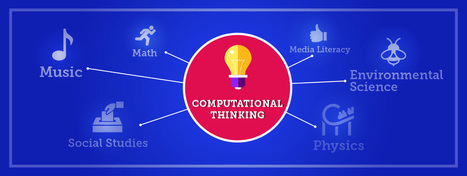


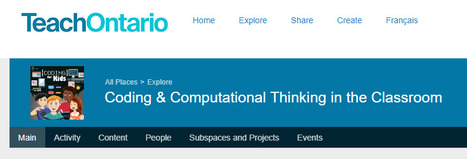

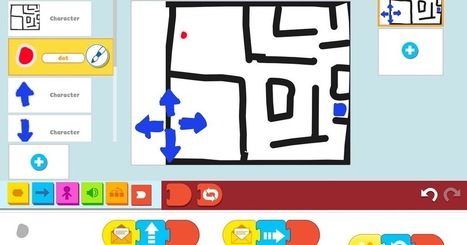


![[Infographic] Discover Computational Thinking | Learning.com | iPads, MakerEd and More in Education | Scoop.it](https://img.scoop.it/eQoiMds36Nt8Y8AFpVjl4zl72eJkfbmt4t8yenImKBVvK0kTmF0xjctABnaLJIm9)

